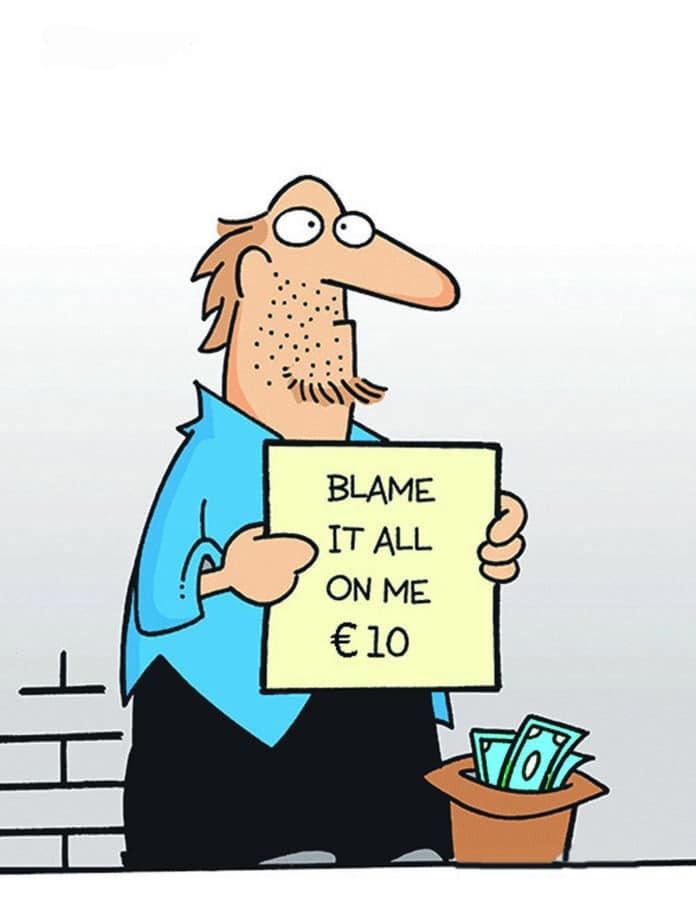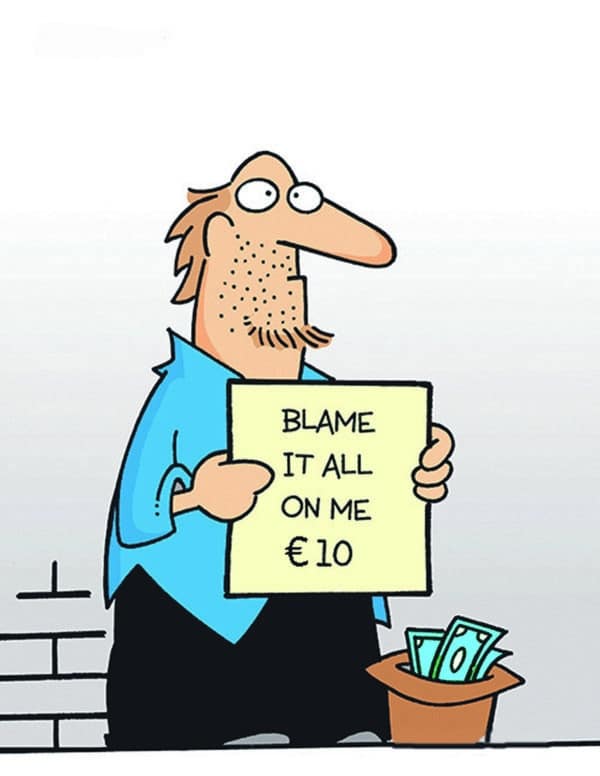
‘Please Sir, he hit me first.’ Two boys found fighting in the playground and each would invariable proffer that one line in his defence to Master Lawlor. ‘I done nothin’, Sir … it was him – he was calling me names.’
It comes naturally to children to blame someone or something for their shortcomings; the classic, ‘the dog ate my homework’, being a prime example. But shouldn’t we as adults have grown out of this weak way of accounting for our mistakes? It is becoming increasingly rare, especially for someone in authority, to put their hands up and proclaim, ‘my fault … I got it wrong. ’ Indeed, if anything, the ‘blame game’ is more prevalent now than ever before.
In modern society everything we get wrong is somebody else’s responsibility. Less and less will you hear a ‘Ben Dunne’, where the individual admits that the ‘hobble’ they find themselves in has anything to do with their action – or lack of it. Radio, TV news and newspapers are crammed with stories of why all of society’s problems are the fault of politicians. No such thing as taking any personal responsibility for any predicament.
Yes, we all know that our citizenry haven’t all kicked off from the same starting block and that life isn’t fair: But once upon a time – and in a time when there were less escape avenues open, most able-bodied people were able to strategise a path of life for themselves. Decisions were made and the people got on with it and blamed nobody for most of life’s roadblocks.
Nowadays we will gladly take the credit for what goes good for us but quickly lay the blame on circumstances or other people when things go badly. We live in a culture of blame. I remember being at a parent’s night in a community school a good few years back. The ‘head’ was getting a hard time from a few parents over Leaving Cert results. Eventually I made this contribution to the debate; ‘if my daughter is the best in the class, she took after me or her mother: If she is the worst in the class – it’s the teacher’s fault.’ End of discussion …
Blaming others is easy and it is the opposite of taking responsibility for what happened to you. Not blaming someone or a litany of circumstances outside your control, means you have to be honest and accept you made a mistake, or could have done better. Blaming someone else gives you control over the story – and the story gets better and more plausible with every new telling. Some people cannot tell a good story without bringing themselves out as a victim.
About 12 years ago I bumped into a man I knew well on the street in Mullingar. I hadn’t met my acquaintance for a couple of years, as our paths had gone winding in different directions. This guy had been a successful businessman and property developer, but the rumour now was that he had lost everything in the Celtic crash. This chat on the street was memorable due to the refreshing honesty of the man. “It’s all gone … I haven’t got a rex to my name”, he said. But it is what he said next that raised him up several notches in my book. Instead of blaming the banks, the government, or the Troika, these were his words; “It is entirely my own fault … just all down to solid greed and ego.” Happily, that man has since pulled himself back up again.
Some ‘blamers’ may even go above the heads of politicians and every other make of mere mortal. ‘The devil made me do it’, is most probably a difficult one to disprove! Whilst across the corridor, God himself is expected to take the rap, especially when bad things happen to good people – as they do.
‘An act of God’, is a legal term used most often in case law, for some severe natural event where no human can be deemed to be responsible.
As for blaming God for all that is wrong with the world, I like the answer that Anne Graham, daughter of evangelist, Billy Graham, gave when an interviewer on TV suggested that God should be blamed for allowing Hurricane Katrina to happen. This is part of Ms Graham’s long reply: ‘For years we have been telling God to get out of our schools, to get out of our government and to get out of our lives, so how can we expect his help when we demand he leaves us alone? We reap what we sow.’
Like we said, there are occasions when somebody else really is to blame for our misfortune, but the most honest proportioning of blame is the man who says, ‘I have nobody to blame but myself.’
Don’t Forget
The most prolific inventors are those who invent excuses for their failures.






